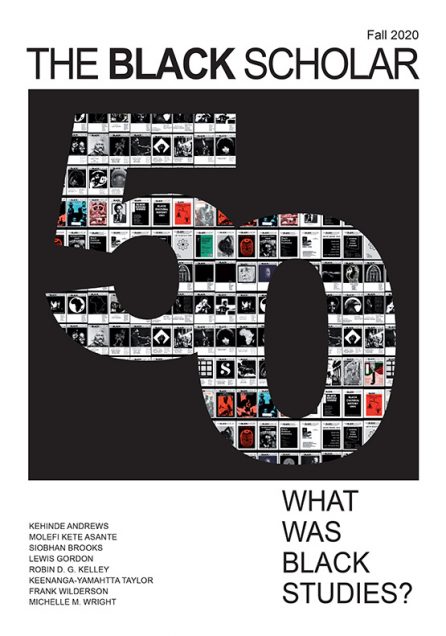50.3, What Was Black Studies?
 Black lives matter. Black thought matters. Black writing matters. Black writing about Black lives matters. Black scholarship, criticism, and research matter. Black memory matters, Black history perhaps most of all.
Black lives matter. Black thought matters. Black writing matters. Black writing about Black lives matters. Black scholarship, criticism, and research matter. Black memory matters, Black history perhaps most of all.
These words have been the credo of The Black Scholar from the apocalyptic year of 1969 to the, well, apocalyptic year of 2020. And so, situated once again “after the end of the world,” as Sun Ra would have it, it is incumbent on us to make sense of origins, presence, and futures.
What Was Black Studies?—an intentionally provocative title—commemorates 50 years in print, which also means 50 years of our entanglement with the ongoing project, commitment, inter-discipline, and reason for the argument called Black Studies. And in the spirit of political apocalypse and the dramas of memory, we’ve assembled a remarkable set of reflections and arguments, frustrated longings and critical conversations, visionary statements and declarations of failure by a range of significant figures in and around (and under?) Black Studies. The goal here is less to argue about origins, but instead to make sense of what it—we, us—have become in its wake, while continuing to engage the multiple, intersecting crises of the present.
Calling these scholars remarkable is no hyperbole: our contributors include Robin D.G. Kelley, Molefi K. Asante, Keeanga-Yamahtta Taylor, Siobhan Brooks, Frank Wilderson, Michelle M. Wright, Lewis Gordon, and Kehinde Andrews. Indeed, the response and support for this issue particularly due to the framing question “What Was Black Studies?” generated so much material that we’ll be featuring longer pieces in imminent issues. All of these scholars were asked to honestly respond to the provocation in any way they felt appropriate. What does Black Studies look like now vs. when they began their engagement with it? What did they think it was vs. what it turned out to be? What can it be? Must it continue being? Is it an ongoing concern or an institutional habit?
We’d like to thank these scholars for their time and patience and their acknowledgement of the historical and current impact of the journal.
For a limited time, access the introduction and Afropessimism and Futures of … : A Conversation with Frank Wilderson
by Linette Park for free.
Subscribe to our 50th anniversary volume here. Personal subscriptions are $41 USD. Volume 50 includes the above issue, plus Going Imperial, At the Limits of Desire: Black Radical Pleasure, and the forthcoming Black Girlhood.
In our 2021 volume, keep an eye out for Black Privacy, Caribbean Global Movements, and more content responding to “What was Black studies?”
For our 2022 volume, we’re working on Post-Soul Afro-Latinidades, Other Black Independent Cinema, and more. . .